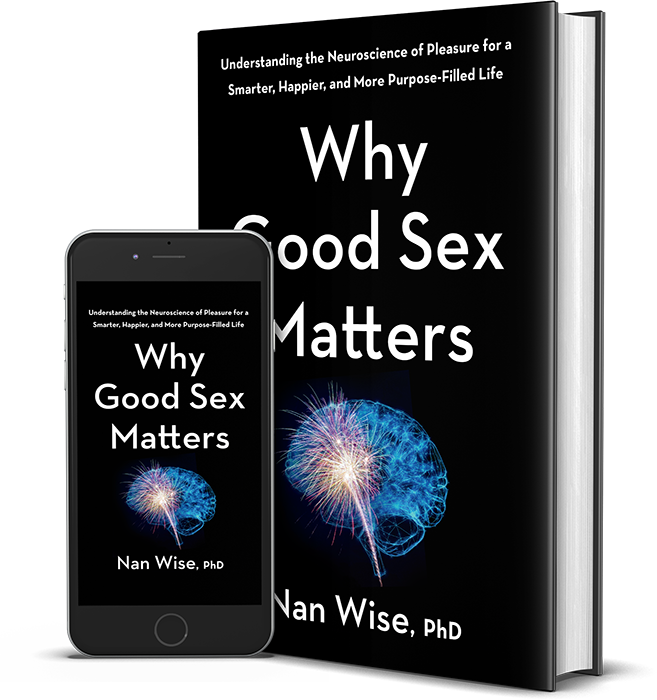How to Increase Immunity, Decrease Panic, and Spread Wellbeing In Times of Crisis
In this article, Dr. Nan Wise goes over her down-to-earth tips for increasing immunity to physical disease and panic, while connecting it to a self-realization of emotions and taking control for a more purpose-driven day without all the noise.
Table of Contents
- Today’s Stress Levels are Rising
- Life Is a Catastrophe, Accept It
- Slow Down and Harness Your Breath
- Crisis Presents Opportunity, Get Curious!
- Start Tuning Into You
- Turn Off Distractions
- Move Your Body
- Connect Consciously
Today’s Stress Levels Are Rising
Psychology teaches that every crisis presents an opportunity for growth and learning. And pleasure is not a luxury even in times of crisis.
In my book Why Good Sex Matters: Understanding the Neuroscience of Pleasure for a Smarter, Happier and More Purpose-Filled Life I go beyond the topic of sex. I address the bigger picture of what I call “The Pleasure Crisis” which has been with us way longer than the coronavirus.
Before the coronavirus, we were stressed out, anxious, and depressed. And having less sex than previously. In fact, the sex recession is a real thing. I even went on The Today Show to talk about our challenges in the bedroom.
Confronted with the coronavirus challenge, we are now even more stressed out (and with good reason). Anxiety is a core emotional response wired into our brains to get our attention so we can take action to avoid harm and protect ourselves. It’s a built-in defense system which keeps us alert of trouble.
But too much anxiety is not a good thing. I call this the panic brain and it works against us when the alarm system is triggered so much that it becomes overwhelming. While short term stress mobilizes us into action, chronic stress depletes the mind and body. It dampens our immunity and takes a big toll on our mood (and mood matters).
The more anxious and depressed we get, the more stressed out we become.
This stress robs us of our ability to enjoy everyday life which makes for even more stress. This becomes a bad cycle that is toxic. It shuts down our ability to experience pleasure.
The capacity to enjoy everyday pleasures, in and out of the bedroom, is key to our wellbeing. But many of us find that finding pleasures that feel good and are good for us (what I call healthy hedonism) is challenging, even under the best of circumstances.
How do we break this cycle in the light of the coronavirus challenge? Here are some pointers.
1. Accept this: Life is Catastrophe
We are born, we live, we all experience trauma in some form, and then we all die. This might sound morbid, but it’s actually not.
Dr. Mark Epstein, who integrates Buddhism into his work, writes about this in his book The Trauma of Everyday Life.
Accepting this is healing.
Radical acceptance of what is so isn’t resignation. It is what makes meditation, prayer, and other mindfulness approaches so helpful. It lets us loosen and soften around what’s happening. It gives us perspective. It allows us to start where we are. It allows us to mobilize and actively cope. And active coping is good for us.
Remind yourself that we can actively cope with the coronavirus by flattening the curve! We are cooperating with our entire community by doing what we can to prevent the transmission of the virus.
Taming the panic brain so we can actively cope is key to wellness.
How exactly do we tame the panic brain?
2. Slow Down and Harness Your Breath
The simplest and most powerful way to calm the panic brain is to harness the power of your breath to elicit what is called the relaxation response.
If possible, breathe in and out through the nostrils. If not, just breathe.
Take a long smooth inhalation (e.g., for the count of 4).
Then a longer smooth exhalation (e.g., for the count of 6).
Rinse and repeat.
What this does is signals to your body to activate the calming portion of your nervous system. It changes your body chemistry. Do this whenever you notice tension in your body. Make this a conscious practice throughout your day.
And while you are breathing, tell yourself this:
“I already have all of the inner resources to create everybody and everything I need”.
This is my go-to self-soothing message I learned training in Eriksonian hypnotherapy. I use it to calm myself and works pretty good most of the time.
What’s next?
Now that we have grounded our nervous system, we get to enlist our SEEKING system–our wired-in ability to get curious, mobilize, and explore. This system is powered by the neurotransmitter dopamine and can be easily hijacked by spending too much time on our devices which has been contributing to the pleasure crisis and sex recession. (For more information about how our SEEKING systems are being dysregulated and what to do about this, read Why Good Sex Matters).
3. Crisis Presents Opportunity so Get Curious!
This is actually an easy step once you ground yourself with your breath. We can develop grit (the ability to dig in and take action) and gain a new perspective by getting curious and engaging our PLAY systems.
What is the PLAY system? Nature wired animals (including us) with the ability to explore and play so we can learn. For most of us grownups, the PLAY system is squashed.
Active coping involves rallying our core emotions of SEEKING and CARE (the system nature gave us to bond with others, powered by our own opioids that give us feelings of well-being) and our wired-in capacity to PLAY by being creative.
Get curious! Ask yourself, “I wonder how I can use this opportunity to learn, grow, and thrive?”
When we ask ourselves these questions, we are actually suggesting to ourselves that in fact we can learn, grow, and thrive. And simply staying with this question is powerful. Plant it in the crockpot of your magnificent brain/mind/body and let it simmer.
What will help this process of thriving? Attuning to ourselves. Mind, body, emotional weather.
4. Start Tuning Into YOU
This step becomes a glorious self-care practice that will empower your ability to thrive.
You simply ask yourself the following three questions three times per day. You can supercharge this by writing your answers down in a journal or sharing it with someone else
What’s on my mind?
Most of us can easily answer this. There is a constant flow of thoughts across the surface of the mind. We just need to learn how to witness this. We are not our thoughts. We are simply thinkers. Watching our thoughts is the first step in not letting them get the best of us.
What’s going on in my body?
This can be a harder question as often people are so consumed by their thoughts they forget they even have a body. When I ask clients to pay attention to the sensations in their bodies, they often look puzzled.
An easy way to do this is to scan your body from head to toe and simply notice any sensations. Tightness? Tingling? Pressure? Warmth? Cold? Butterflies? Heaviness? Lightness?
Life is indeed sensational when we get in touch with our sensations.
What’s my emotional weather?
Emotional weather is what we are experiencing in our emotions in the moment.
Happy? Sad? Scared? Caring? Lustful? Lonely? Depressed? Joyful? Motivated? Something else?
By acknowledging these emotions, we can allow them to be as they are. We can allow ourselves to be as we are. We can feel our feelings and then they peak and release. This takes us back to the practice of radical acceptance. Yay!
5. Turn Off the Distractions
This step can be challenging which is why it comes after the other steps. This is when we do some habit busting. We unplug from our devices.
Three times a day take a total break from all devices–turn them off or put them away in another room.
Why is this important?
Short answer–continuously monitoring our devices is bad for us.
Continuous partial attention is a term that describes how we constantly divide our attention. Think of it as being plugged into our devices on standby. We wait for notifications, messages, likes, and other input.
We are no longer present to the moment. We are no longer present to the people in the room. This hijacks our emotional brains and sabotages our capacity to connect to others. This contributes to the sexual recession and pleasure crisis.
This also results in higher levels of emotional distress. Our defenses of FEAR, RAGE, and PANIC increase. This robs us of the benefits of satisfying intimacy–both in and out of the bedroom. As it happens good relationships (intimate and otherwise) are the best natural mood stabilizers and stress-management tools known to man.
6. Move Your Body
The best way we can move through our emotional weather is to move our bodies and change our physical states.
In the wake of the coronavirus challenge (or any other challenge) take yourself outside and walk. We need natural sunlight for the proper operation of our core emotional systems.
Fun fact: Did you know that sunlight goes directly from the back of the eye to the hypothalamus (which controls just about everything in the way of our hormones and body functioning)?
Sunlight and movement together are natural wellbeing promoters. We can flatten the coronavirus curve and boost our own immunity with some fresh air.
7. Connect Consciously!
What do you do when you are taking a break from your devices? You could pay attention to the people in the room. That’s why our parents’ generation had more sex than we do. Less distraction leads to more attraction!
Accessing the LUST system can be extremely beneficial.
Sex (with yourself or others) may boost immunity. Nature in her infinite wisdom wired in our urge to merge. Accessing the LUST system can be extremely beneficial.
Even non-sexual touch is a potent medication by releasing nutritious and delicious chemicals that enhance our wellbeing including oxytocin and our own internal opioids.
By the way, if you don’t have access to people in the room, then digital means such as FaceTime, Zoom or Skype can provide those same benefits to the brain.
Fun fact: hearing other human beings voices (when they are friendly and soothing) helps decrease our stress reactions.
Forget about texting when it comes to connecting. Listening to the voice of someone is much better! Next to that is seeing them virtually. The best of all is face-to-face and flesh-to-flesh connection, (providing that we use common sense about exposure to the coronavirus).
Bottom line?
Life will bring challenge. We’re doing to deal with anxiety and stress.
We can actively cope with the coronavirus, soothe our panic systems, and cooperate to flatten the curve. We can take this challenge we face today an an opportunity to reboot our emotional systems for the better if we understand how our brains work, and react in a self-aware manner. Most importantly, make sure you’re allowing yourself to access that pleasure brain.




